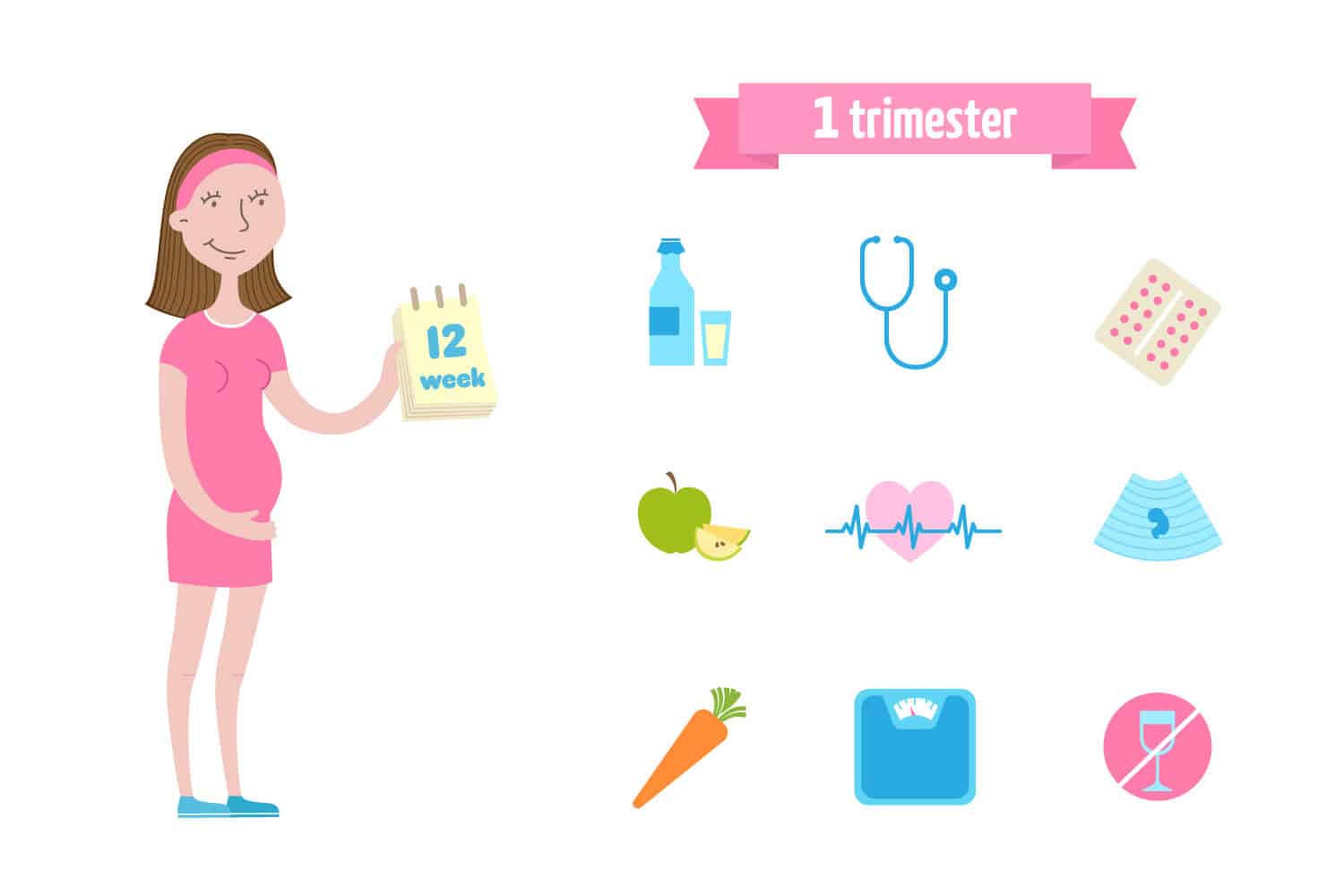
Big congratulations on becoming pregnant! This is one of the happiest moments in a female’s life and from this point onwards, your life changes completely – for the better. This happiest moment has arrived in your life. A normal pregnancy lasts about 9 months, i.e. 40 weeks from the date of your last menstrual cycle. Once the pregnancy is confirmed, you need to take proper care and precautions during these nine months of pregnancy.
The entire period of pregnancy is divided into three phases, as below:
First three months i.e. 1st, 2nd and 3rd months of pregnancy are known as the First Trimester of pregnancy.
Next three months i.e. 4th, 5th and 6th months of pregnancy are known as the Second Trimester of pregnancy.
Last three months i.e. 7th, 8th and 9th months of pregnancy are known as the Third Trimester of pregnancy.
In this article, we will be taking up the First Trimester – Symptoms, Physical Changes, Development of the Baby, Diet, Cautions to be observed and some tips for a happy, exciting first trimester.
Being pregnant calls for a lot of changes in you. While you will be all excited and emotional to know about your pregnancy, it may also be stated

here that chances of a miscarriage are also high during the first trimester. It is during the first 12 weeks of pregnancy that major development of your foetus occurs and you may experience profound physical and emotional changes. During this phase of pregnancy, your body starts getting adjusted to the new life inside you, and it is important to take certain precautions to prevent miscarriage. This phase is a sensitive one, as the foetus is in its early developmental stage, hence, adequate care and caution has to be exerted.
Symptoms
During your first trimester you may not be supporting a bump, thus not looking anything like pregnant, but there are various changes going on within the body. Pregnancy brings with it several changes at both the mental and physical levels. There are numerous symptoms that you shall experience during the first trimester. As every woman is different; the symptoms experienced during pregnancy too, shall differ from person to person. With pregnancy evolving, most of the symptoms lessen or disappear. Few of the symptoms that you may experience during pregnancy are as follows:-
- Mood swings

Morning Sickness - Fatigue.
- Slight bleeding or implantation bleeding which is an indication that the embryo has implanted itself into the uterine wall.
- Abdominal cramping.
- Morning sickness or nausea is caused due to increased progesterone levels.
- Heightened sense of smell.
- Food aversions and cravings are caused because of hormones.
- Increase frequency to urinate is credited to hCG (pregnancy hormone), which accelerates flow of blood to kidneys. The growing uterus too, exerts some pressure on your bladder which drives you to urinate more frequently.
- Bloating is because of the hormone progesterone, which slows down digestion, enhancing the flow of nutrients into your bloodstream, directing to your baby.
Physical Changes:
There are several physical changes that take place within the body.
- Breasts enlarge and become tender and heavier due to increasing levels of hormones estrogen and progesterone.
- Nipples become darker and sore to touch.
Baby’s Development
Development of the baby that takes place during this trimester are –
- Baby changes into an embryo from a single fertilized cell. The embryo implants itself to the uterine wall.
- Formation of placenta, an organ which is responsible for transfer of nutrients from the mother to the baby.
- Organs start taking shape.
- Movement of the baby starts.
- Formation of hair follicles.
- Formation of nail beds.
- Muscle formation.
- Production of white blood cells.
- Development of vocal cords, etc.
Medical Tests
During your first visit to the gynaecologist, details regarding your medical history shall be noted and a comprehensive physical examination

shall be done. You shall be asked to undergo a series of investigations such as – Urine analysis; blood test to determine the group, Rh status, haemoglobin levels, hCG levels, screening for chromosomal defects like congenital heart disorders or Down’s syndrome; Pap smear; Routine ultrasound to confirm the progress of development; etc.
Caution
One needs to be extremely cautious during this stage of pregnancy as several early foetal developmental changes take place. You need to be cautious when –
Using any medicines, it may be harmful to the baby.
Using cleaning products or household chemicals.
Diet
The little one inside you is also gearing up for life. He will be absorbing all his needs from his mother. Thus, diet plays an important role in maintaining and sustaining pregnancy. Adequate diet shall help maintain the health of child and mother.
Some of the dietary regime to be followed is:-
- Consume a balanced diet.
- Encourage small regular meals and plenty of fluids.
- Increase intake of fresh fruits, vegetables, rotis, meat, chicken, eggs, pulses, soya, milk, cheese, paneer, curd, etc.
- Ensure that meats, poultry and fish are properly cooked.
- Consume only pasteurized dairy products.
- Consume vitamins and other supplements.
- Regular intake of folic acid supplements. Folic acid protects the baby from brain and spinal cord complaints.
- Avoid sea foods, unpasteurized cheese, unpasteurized milk, juices, apple cider, raw eggs or foods, homemade ice cream, raw or undercooked fish (sushi), shellfish, or meats.
Tips
Tips for an uncomplicated pregnancy are as follows:-
- Consult a gynaecologist.
- Quit smoking and alcohol.
- Limit intake of caffeine. It can increase your chances of miscarriage.
- Certain food products are too be avoided during pregnancy as they may contain harmful bacteria or toxins which could harm your baby.
- Avoid dieting during pregnancy. Weight gain during pregnancy is essential.
- Avoid stress and depression. High levels of stress can affect the unborn baby’s health and increase your chances of miscarriage.
- Avoid hot tubs and saunas as the high temperature may disrupt the normal development of the foetus.
- Be aware regarding the danger signs during pregnancy.
- Perform regular gentle exercises which can help you cope with pregnancy.
- Pelvic floor exercises should be done as they prevent the leakage of urine when pregnant.
- Take ample sleep as hormonal changes in the body shall make you feel tired.
You need to follow the above mentioned guidelines for a successful first trimester. Wish you a very happy first trimester, ladies!

